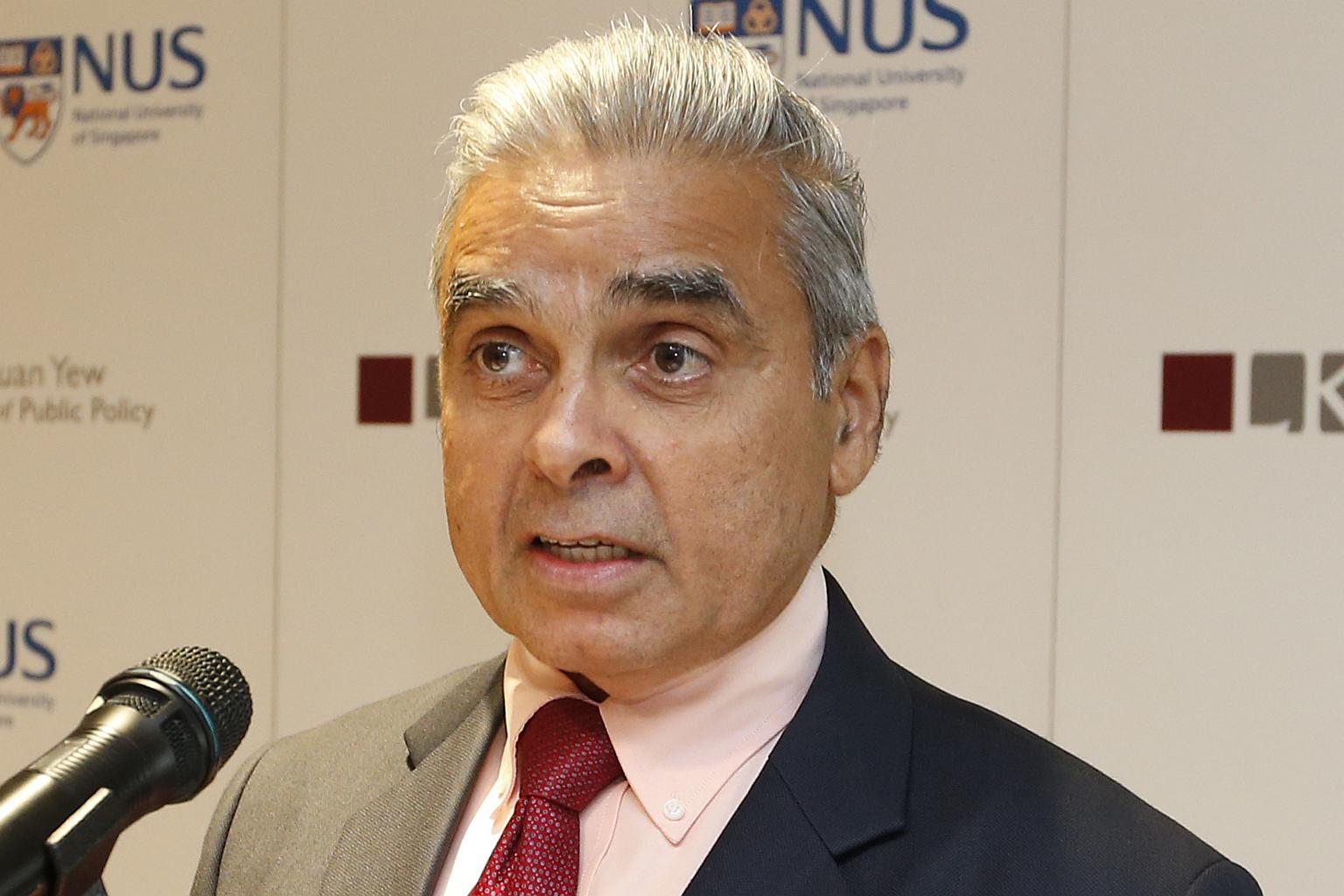In defence of Singapore's chief naysayer Kishore Mahbubani
Sign up now: Get ST's newsletters delivered to your inbox

ST PHOTO: CHEW SENG KIM
In an opinion piece titled "Qatar: Big lessons from a small country", Professor Kishore Mahbubani cited three lessons Singapore should learn from the Gulf blockade of Qatar. Kishore said the experience of Qatar reminds Singapore of the need for small states to behave like small states, and to cherish regional and international institutions. For example, he said small states should exercise discretion, that "we should be very restrained in commenting on matters involving great powers".
He gave examples of how Singapore could have better conveyed its "consistent and principled" position on the upholding of International Law in relation to geopolitical disputes over the South China Sea, and how the country could do more to strengthen regional institutions such as ASEAN.
His commentary received swift rebuttals from the likes of Singapore's Ambassador-at-Large Bilahari Kausikan. The crux of Bilahari's rebuttal lies in his vehement opposition to what he sees as an acceptance of "subordination as a norm of relationships" in the face of pressure from bigger powers.
As an admirer of both Kishore and Bilahari, I do not find this exchange of differing viewpoints particularly unexpected. After all, Kishore implied in his book "Can Singapore Survive" that the strongest assurance of Singapore's continued success is an educated, more informed electorate, upon which sound domestic politics could thrive.
In his recently launched compilation of speeches and essays titled "Singapore is not an island", Bilahari asserted in tandem that sound domestic politics is the foundation for sound foreign policy.
In a livelier civil society, it is inevitable that healthy debates on public affairs - both foreign and domestic - should ensue.
And while it might be rather reckless of me to jump to the defence of Kishore, I would like to suggest that Kishore was merely true-to-form, as his "second incarnation as the outstanding Dean of the Lee Kuan Yew School of Public Policy" - a description attached to Kishore by Singapore's elder statesman Professor Tommy Koh.
In February this year, Kishore was among a panel of speakers at the Singapore Management University who shared their thoughts on what is needed for Singapore to do well in the next 50 years. The panel espoused that "Singapore needs more people to speak up and challenge authority", as they lamented the reluctance of civil servants to challenge political office-holders. At the dialogue, he called for more naysayers and cautioned that Singapore cannot take its success for granted.
On foreign affairs, Kishore too has never been shy of taking a contrarian viewpoint to trigger debates to arrive at out-of-the-box scenarios, or to stand up for one's principles. The close of the Cold War saw the shaping of a Western hegemony.
That was an era when liberal values, along with the generous export of economic wealth from the West, flowed to Asia. Among these values was the universality of absolute freedoms of the individual even at the expense of the broader community. It was at the height of such dominant Liberal thinking that Kishore penned books such as "Can Asians Think? Understanding the Divide Between East and West", in which he railed against Western arrogance while standing up for values that were inherent to - and necessary for - smaller countries in emerging Asia.
It should be noted that while Singapore was not an insignificant beneficiary of this Western hegemony, Kishore had always cautioned that it was more important to uphold one's sovereignty by taking principled positions that serve Singapore's interests, even at the risk of offending larger powers.
Kishore's track record of standing up for Singapore runs contrary to the impression that the Dean had implied that Singapore should take on a subordinate position when dealing with larger powers. In fact, what was noteworthy in Kishore's recommendation, which these rebuttals had not sufficiently recognised, is that how small states like Singapore must exercise discretion in their "Machiavellian" approach to foreign affairs.
In "The ASEAN Miracle", Kishore established a strong case for the regional grouping as a "catalyst for peace". He reveals how Singapore has for many years played a discrete but leading role within ASEAN.
Kishore remains a stirred up "rebel" for Singapore, albeit in a way he believes best serves the country, as naysayer-in-chief in both domestic and foreign affairs. His naysaying has already achieved its purpose, by evoking strong public responses from experts like Bilahari, Ambassador-at-large Ong Keng Yong and Minister Shanmugam, forcing further discussion of Singapore's foreign policy position on these key issues on platforms with a much wider reach. As Bilahari has said, "Domestic debates over foreign policy are not necessarily a bad thing provided they take place within parameters defined by shared assumptions."
On that account, Kishore's commentary meets this criterion and gets a wider audience talking - and thinking - about diplomacy and foreign affairs.
stopinion@sph.com.sg
The writer is a Council Member of the Institute of Public Relations Singapore and Vice President of Marketing and Corporate Communication at one of Singapore's leading private education institutions, PSB Academy. A version of this article first appeared in Asia Times.


